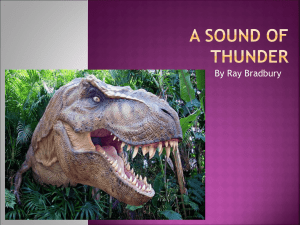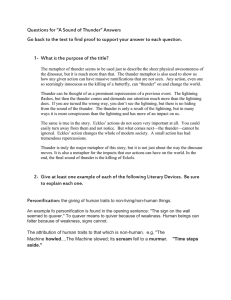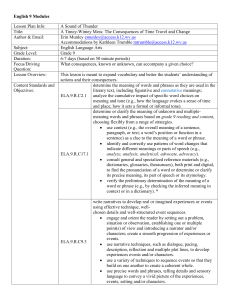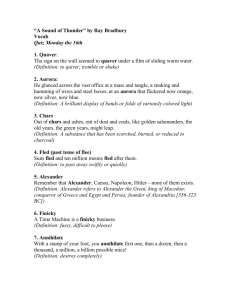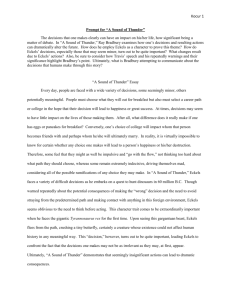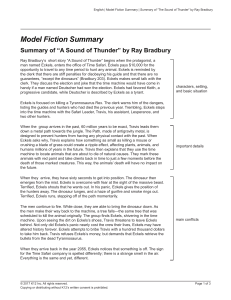Easter School Nat 5 essay
advertisement
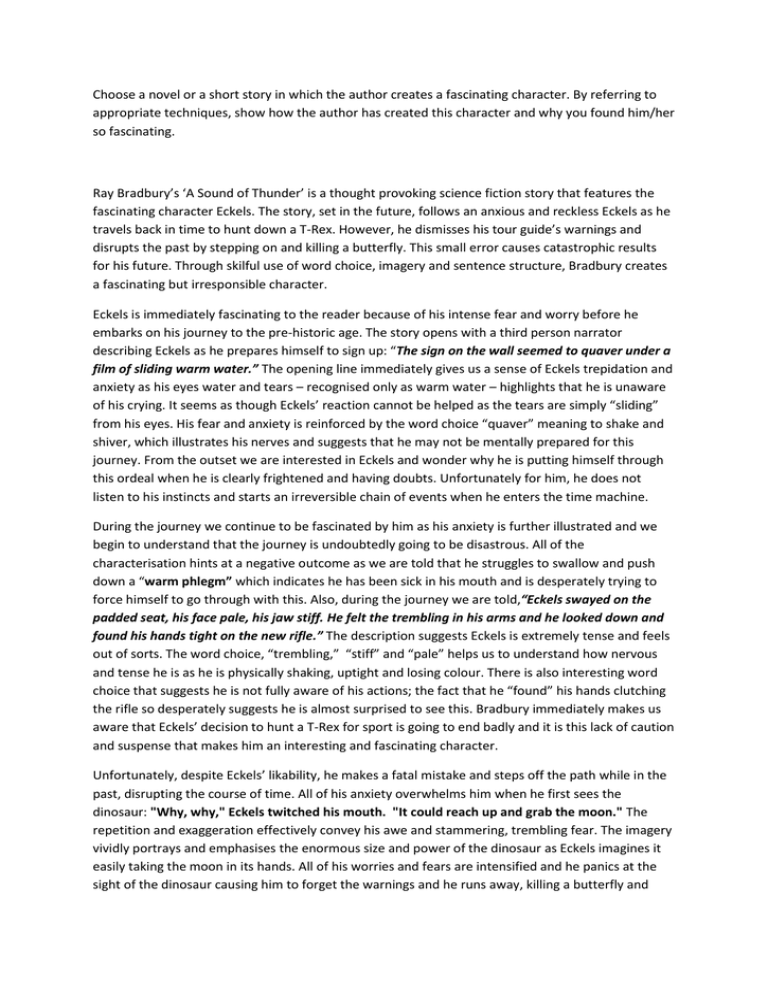
Choose a novel or a short story in which the author creates a fascinating character. By referring to appropriate techniques, show how the author has created this character and why you found him/her so fascinating. Ray Bradbury’s ‘A Sound of Thunder’ is a thought provoking science fiction story that features the fascinating character Eckels. The story, set in the future, follows an anxious and reckless Eckels as he travels back in time to hunt down a T-Rex. However, he dismisses his tour guide’s warnings and disrupts the past by stepping on and killing a butterfly. This small error causes catastrophic results for his future. Through skilful use of word choice, imagery and sentence structure, Bradbury creates a fascinating but irresponsible character. Eckels is immediately fascinating to the reader because of his intense fear and worry before he embarks on his journey to the pre-historic age. The story opens with a third person narrator describing Eckels as he prepares himself to sign up: “The sign on the wall seemed to quaver under a film of sliding warm water.” The opening line immediately gives us a sense of Eckels trepidation and anxiety as his eyes water and tears – recognised only as warm water – highlights that he is unaware of his crying. It seems as though Eckels’ reaction cannot be helped as the tears are simply “sliding” from his eyes. His fear and anxiety is reinforced by the word choice “quaver” meaning to shake and shiver, which illustrates his nerves and suggests that he may not be mentally prepared for this journey. From the outset we are interested in Eckels and wonder why he is putting himself through this ordeal when he is clearly frightened and having doubts. Unfortunately for him, he does not listen to his instincts and starts an irreversible chain of events when he enters the time machine. During the journey we continue to be fascinated by him as his anxiety is further illustrated and we begin to understand that the journey is undoubtedly going to be disastrous. All of the characterisation hints at a negative outcome as we are told that he struggles to swallow and push down a “warm phlegm” which indicates he has been sick in his mouth and is desperately trying to force himself to go through with this. Also, during the journey we are told,“Eckels swayed on the padded seat, his face pale, his jaw stiff. He felt the trembling in his arms and he looked down and found his hands tight on the new rifle.” The description suggests Eckels is extremely tense and feels out of sorts. The word choice, “trembling,” “stiff” and “pale” helps us to understand how nervous and tense he is as he is physically shaking, uptight and losing colour. There is also interesting word choice that suggests he is not fully aware of his actions; the fact that he “found” his hands clutching the rifle so desperately suggests he is almost surprised to see this. Bradbury immediately makes us aware that Eckels’ decision to hunt a T-Rex for sport is going to end badly and it is this lack of caution and suspense that makes him an interesting and fascinating character. Unfortunately, despite Eckels’ likability, he makes a fatal mistake and steps off the path while in the past, disrupting the course of time. All of his anxiety overwhelms him when he first sees the dinosaur: "Why, why," Eckels twitched his mouth. "It could reach up and grab the moon." The repetition and exaggeration effectively convey his awe and stammering, trembling fear. The imagery vividly portrays and emphasises the enormous size and power of the dinosaur as Eckels imagines it easily taking the moon in its hands. All of his worries and fears are intensified and he panics at the sight of the dinosaur causing him to forget the warnings and he runs away, killing a butterfly and sparking a cause and effect reaction down through time. Eckels remains an interesting character here as we almost expected him to make this mistake and we’re fascinated by the way he reacts to the T-Rex. Finally, in the end we sympathise with Eckels who has realised too late his mistakes. His regret and shock when he returns to the future to find that he has killed a butterfly and therefore caused a dictator to be elected is really clear: “Can't we," he pleaded to the world, to himself, to the officials, to the Machine, "can't we take it back, can't we make it alive again? Can't we start over? Can't we-” Bradbury again uses repetition to clearly show how dumbfounded Eckels is. His desperation is clear from the word choice “pleaded” revealing the intensity of his request and the questions also add to his sense of remorse. Of course, he can’t take it back and he unfortunately pays the ultimate price for his stupidity. The story ends with the line and “there was the sound of thunder,” insinuating that he has been shot BY Travis the tour guide for his mistake. Eckels, although reckless, was a likable character and we are shocked by the dramatic ending. In conclusion, Ray Bradbury creates a really vivid and realistic character in Eckels. He is flawed but that is what makes “A Sound of Thunder” such an interesting story. Eckels fascinates us as he realised too late that we must take great care when meddling with nature and science and we must be cautious with technology as we do not know what the consequences could be in the future. It was a gripping story that really made me think about how the world and what the future of our planet will look like if we continue to advance our technology and scientific endeavours. 17/20 Star – Excellent knowledge of the text and this allows you to structure your essay well Star – Great analysis of quotations which allows you to provide a really good response to the question Wish – Try to use more evaluative language (e.g. skilful, powerful, interesting, thought-provoking etc.)
